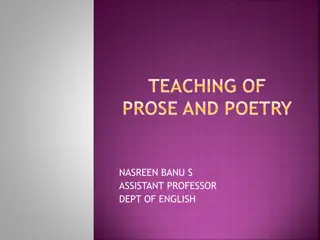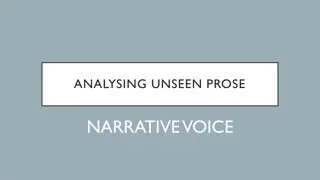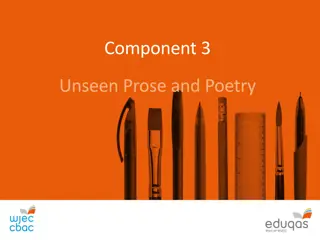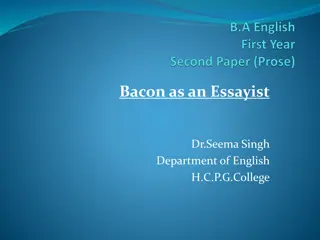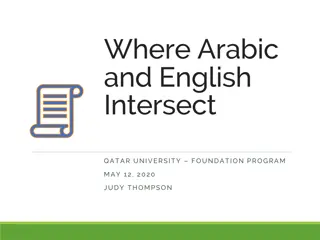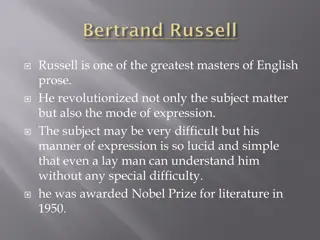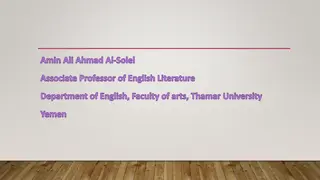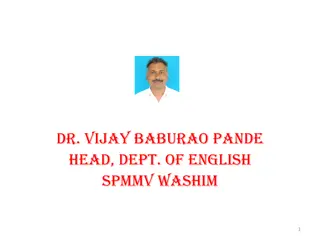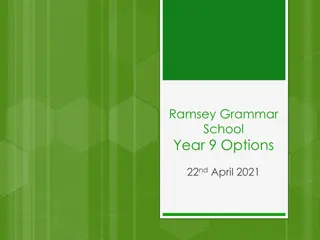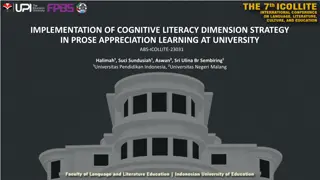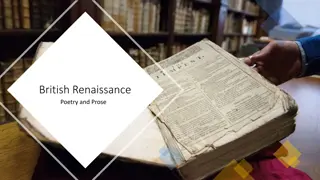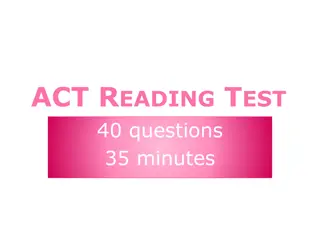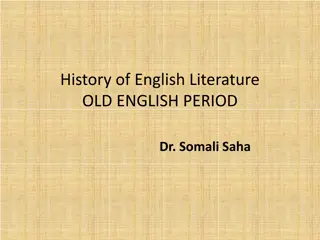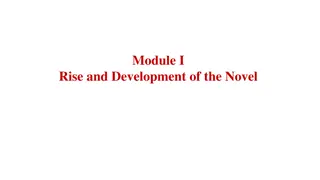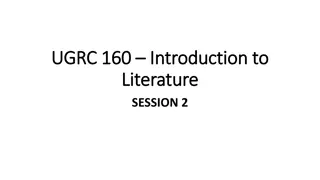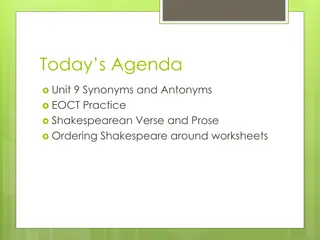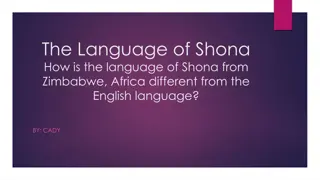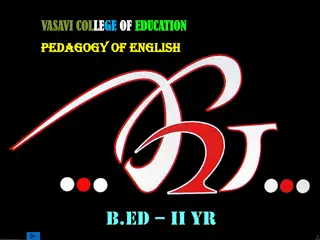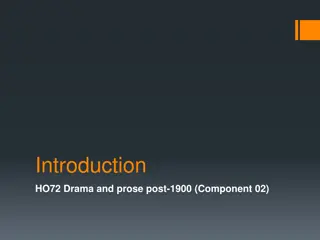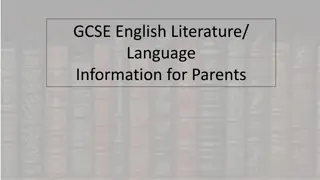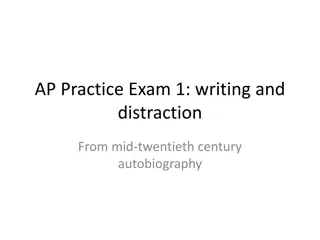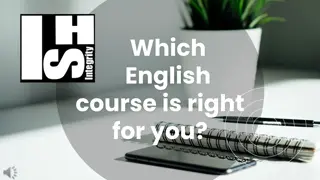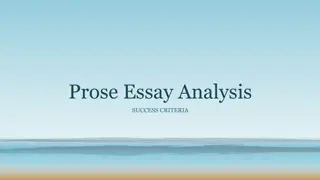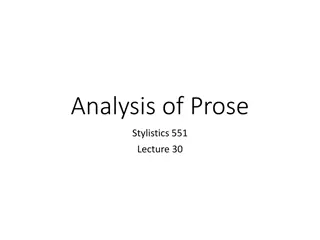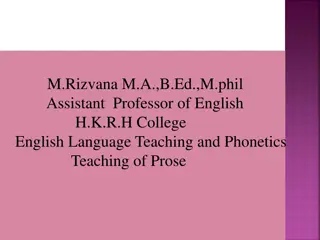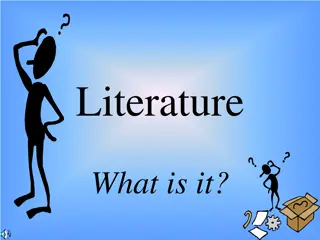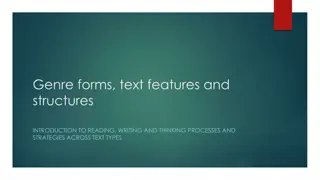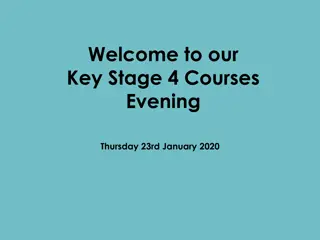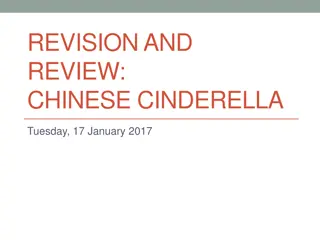Mastering English: A Comprehensive Approach to Teaching Language Skills
Education is not just preparation, but life itself. English language holds a vital place in our educational system and national life. This presentation explores the aims and objectives of teaching English, emphasizing the importance and impact of mastering the language at different education levels.
5 views • 32 slides
The Etymology of Modern English Vocabulary: A Detailed Analysis
The etymology of modern English vocabulary explores words of native Anglo-Saxon origin, Germanic borrowings, and English elements, examining their characteristics and assimilation into the language. It delves into the ways borrowing occurs, criteria for assimilation, and the distinct layers comprisi
8 views • 15 slides
Teaching of Prose and Poetry by Nasreen Banu - A Comprehensive Guide for English Learners
Delve into the intricacies of teaching prose and poetry with insights from Assistant Professor Nasreen Banu. Learn about the aims, general objectives, steps, and alternative methods for engaging students in English language learning. Enhance listening and speaking skills through a structured approac
0 views • 19 slides
Understanding Narrative Perspective in Unseen Prose Narratives
Explore the narrative voice in unseen prose narratives through the analysis of different narrative perspectives, such as homodiegetic and heterodiegetic narrators. Understanding these terms helps in interpreting the impact of perspective on storytelling and themes in literary texts for exam preparat
1 views • 17 slides
Evolution of English Literature: From Old English to Beowulf
The English language, evolving over 1,400 years, transitioned from Old English to Middle English with works like Beowulf standing as a pinnacle of Old English literature. The epic poem tells the tale of Beowulf's heroic feats in pagan Scandinavia, showcasing elements of alliteration, a key literary
0 views • 46 slides
Overview of Poetry Genres and Elements for English Students
Explore different genres of poetry including narrative, epic, dramatic, satirical, elegy, fable, and prose poetry. Delve into the unique elements of poetry such as diction and figurative devices like simile and metaphor. Engage with various examples from renowned poets and learn about the aesthetic
1 views • 25 slides
Insights into Unseen Prose and Poetry Analyses
Delve into the assessment of unseen prose and poetry with a focus on introductions, candidate evaluations, and critical engagement. Explore the importance of contextual references, vocabulary analysis, and integration of other readings in shaping responses to literary texts.
1 views • 12 slides
The Influence of Sir Francis Bacon as an Essayist
Sir Francis Bacon, regarded as the father of English essay, revolutionized the English prose with his profound and objective essays. He emphasized practicality and utilitarianism in his works, offering counsel on leading a successful life. Bacon's essays evolved through multiple editions, showcasing
0 views • 10 slides
Exploring the Intersection of Arabic and English Language Learning
Delve into the fascinating world where Arabic and English intersect, with a focus on language learning patterns, the brain's process of acquiring new information, essential driving patterns, English pronunciation, and the intriguing history of the English language's phonetic alphabet. Discover the c
0 views • 24 slides
Exploring the Mastery of English Prose: The Style of Bertrand Russell
Bertrand Russell, a Nobel Prize-winning writer, revolutionized English prose with his lucid and simple expressions on complex subjects. Known for his use of long sentences, terseness, allusiveness, and irony, Russell's style combines clarity with deep meanings and continuity of thought. His allusion
0 views • 11 slides
Challenges and Perspectives in Academic Writing for English Students: Insights from Yemeni Education System
Amin Ali Ahmad Al-Solel, an Associate Professor of English Literature at Thamar University in Yemen, shares insights on the challenges faced by English learners in Yemen. From outdated curriculum and lack of resources to struggles with writing skills, the educational system in Yemen poses significan
0 views • 14 slides
Exploring English Literature through B. Prasad's Perspective
Delve into the study of English literature through the insightful division laid out by B. Prasad, covering poetry, drama, and prose. Gain a deep understanding of subjective and objective poetry, various poetical types, stanza forms, and different schools and movements in literature.
0 views • 14 slides
Importance of Teaching English at Different Education Levels
English language holds a significant position in the educational system and national life of India. This presentation by Dr. A. Mary Delphine highlights the aims and objectives of teaching English, emphasizing its importance in India and the modern world. The objectives include understanding the rat
1 views • 32 slides
GCSE English Literature Exam Overview
This overview provides information on the GCSE English Literature exam structure, content, and assessment objectives for both components. It includes details on the texts studied, such as Shakespeare, poetry, post-1914 prose/drama, and 19th-century prose. Students are assessed on their ability to re
0 views • 23 slides
GCSE English Literature Exam Overview
This GCSE English Literature exam overview provides details on the components, assessment objectives, text choices, and key information for students. It covers Shakespeare, Poetry, Post-1914 Prose/Drama, 19th Century Prose, and Unseen Poetry. Students will engage with a variety of texts ranging from
5 views • 23 slides
Understanding Cambridge IGCSE English Literature Course at Ramsey Grammar School
The Cambridge IGCSE English Literature course at Ramsey Grammar School for Year 9 students covers drama, prose, and poetry. Emphasis is on analytical response and interpretation of texts. Success in the course requires dedication to independent learning, critical thinking skills, and organizational
6 views • 8 slides
Implementation of Cognitive Literacy in Prose Appreciation Learning
The study focuses on the implementation of cognitive literacy dimension strategy in prose appreciation learning at universities. It discusses the impact of technological advances on society and the importance of incorporating moral values in education. The research findings indicate that the cogniti
0 views • 8 slides
Practical Criticism: Analysis and Appreciation of Poetry and Prose
Delve into the world of practical criticism and critical appreciation in BA III English studies with a focus on analyzing and appreciating poetry and prose. Explore the history, significance, and methodology behind this literary practice while gaining insights into interpreting unseen poems. Discove
3 views • 20 slides
British Renaissance Poetry and Prose: Influential Poets and Their Works
Explore the world of British Renaissance poetry and prose through the works of renowned poets like Sir Thomas Wyatt, Edmund Spenser, and Sir Philip Sidney. Dive into the evolution of the sonnet form, from Wyatt's introduction of the Italian/Petrarchan sonnet to Spenser's masterpieces like "The Faeri
1 views • 13 slides
Understanding Paragraph Organization in Historical Prose Writing
Explore the D-N-A structure of paragraph organization in historical prose writing, focusing on transitional words, revision strategies, and the inseparable connection between history and writing. Learn how to develop effective paragraphs that guide the reader through your historical narrative.
0 views • 18 slides
Understanding the ACT Reading Test Content
The ACT Reading Test comprises 40 questions to be answered in 35 minutes, covering four categories: Prose Fiction, Humanities, Social Sciences, and Natural Sciences. Each category has a specific percentage of questions. The test evaluates your ability to comprehend various passages, including prose
1 views • 24 slides
Overview of Anglo-Saxon Literature in Old English Period
The Old English period in English literature, dominated by the Anglo-Saxons, showcased a rich tapestry of poetic works, notable authors, and distinct dialects. Key literary features include pagan and Christian elements, as seen in epic poems like Beowulf and Caedmonian Poems. Additionally, the perio
0 views • 11 slides
Evolution of the Novel: From Medieval Romances to Elizabethan Fiction
The evolution of the novel traces back to the Medieval period with the rise of Anglo-Norman romances and the foundation of English prose. The transition through the 15th and 16th centuries saw the emergence of notable works by authors like Chaucer, Caxton, Sidney, and Milton, shaping the novel into
0 views • 20 slides
Understanding Elements of Fiction in Prose Writing
This session delves into the essential elements of fiction in prose writing, covering plot development, characterization, setting, and more. Students will learn to analyze and interpret these elements in stories, with a focus on applying their understanding to a specific short story. Through detaile
0 views • 15 slides
Understanding Shakespearean Verse and Prose: A Comprehensive Guide
Delve into the intricate world of Shakespeare's language with a focus on prose, rhymed verse, and blank verse. Learn how to distinguish between these forms and their significance in his plays through visual and textual clues. Explore examples of rhymed couplets and heroic couplets, shedding light on
0 views • 24 slides
Contrasting Shona and English Languages in Zimbabwe
The language of Shona in Zimbabwe, Africa, differs from English in various aspects such as script symbols, alphabet, official usage, borrowing of words, and number of speakers. Shona has a script with 35 symbols, while English has a 26-letter alphabet. English is the official language of the USA, wh
0 views • 5 slides
Comprehensive Pedagogy of English for B.Ed Second Year Trainee Teacher at VCE Hr. Sec. School
Enhance English teaching skills for 9th grade students focusing on prose literature and language development. Objectives include improving pronunciation, vocabulary, and language skills through a structured curriculum using various teaching aids.
0 views • 9 slides
Influence of Indian English in "The Jewel in the Crown" by Rochana Jayasinghe
Indian English plays a significant role in the Indian subcontinent with 200 to 333 million English speakers. India is a key player in the English language landscape, publishing more books in English than any other language. The British Raj from 1858 to 1947 shaped the prominence of English in India,
0 views • 18 slides
Study of Modern Drama and Prose Post-1900
This component focuses on the study of a modern play (The History Boys) and a modern prose text (The Great Gatsby). Learners explore cultural and contextual influences on writers and readers, analyze literary texts, demonstrate understanding of contexts, and make connections across texts. The examin
0 views • 23 slides
Approaching GCSE English Literature Exam Questions
GCSE English Literature exams consist of Paper 1 on Shakespeare and 19th-century prose, and Paper 2 on modern plays and poetry. The assessment objectives include reading, analyzing language, understanding contexts, and using vocabulary effectively. Students can approach questions by linking extracts
1 views • 19 slides
Mastering AP English Literature Exam Techniques
Prepare effectively for the AP English Literature exam by understanding the question difficulty levels, overcoming obstacles faced by writers, and analyzing the relationship between speakers and characters. Practice making sophisticated inferences and recognizing rhetorical elements to excel in answ
0 views • 39 slides
GCSE English Language and Literature Overview
GCSE English Language and Literature subjects are led by Mrs. A. Baker and Mr. Doodson. English Language is examined by OCR, while English Literature is examined by Edexcel. Both subjects have two examination papers worth 100% of the grade. English Language papers focus on reading and writing skills
0 views • 14 slides
Choosing the Right English Course for Your HSC: Advanced, Standard, or Studies?
When preparing for the HSC, selecting the appropriate English course is crucial as it is compulsory. Options include Advanced English, Standard English, and English Studies, each offering unique benefits. Advanced English challenges students with higher-order thinking skills, while Standard English
0 views • 25 slides
Prose Essay Analysis Success Criteria
Explore the steps involved in analyzing a prose essay for success criteria. From reading the exemplar essay to developing criteria and reflecting on improvement strategies, this process aims to enhance writing skills and achieve measurable goals in future essays.
0 views • 6 slides
Understanding Stylistic Analysis in Literature
Stylistic analysis in literature involves examining linguistic features like lexis, grammar, foregrounded elements, and context to distinguish between literary and non-literary prose. While poetry allows for whole text analysis due to its brevity, prose analysis often focuses on selected extracts fo
0 views • 16 slides
Effective Strategies for Teaching English Prose - A Comprehensive Guide
Teaching English prose is a fundamental aspect of language education, focusing on reading comprehension, vocabulary enrichment, and writing skills. This guide covers the objectives of teaching prose, including enhancing comprehension, pronunciation, vocabulary, and writing abilities. It emphasizes i
0 views • 21 slides
Exploring the World of Literature
Literature encompasses various genres such as poetry, drama, and prose, each with unique elements and characteristics. It provides a platform for expressing ideas, emotions, and stories in a creatively compelling manner, capturing the interest of readers for generations. Discover the artistry of poe
0 views • 12 slides
Understanding Genre Forms, Text Features, and Structures in Reading, Writing, and Thinking
Explore the world of genre forms, text features, and structures in this engaging session. Learn to classify different texts, recognize generic features, and understand the main literary genres including prose, poetry, and drama. Delve into the nuances of prose writing, the musical quality of poetry,
0 views • 22 slides
Key Stage 4 Courses Overview: GCSEs, Qualifications, Curriculum, and Examinations
Explore the Key Stage 4 courses offered, including details on GCSE grading, J Scale for GCSE comments, qualification types, Year 9 curriculum, Year 10 and 11 curriculum, GCSE English examinations, and science options. Gain insights into English Language, English Literature, Maths, Science, Humanitie
0 views • 29 slides
Analysis of Structure and Form in Chinese Cinderella
Explore the internal organization and prose style of the text "Chinese Cinderella" through an examination of structure, narrative form, dialogue usage, and character development. Dive into how the sections are divided, the use of dialogue to define characters, and the indicators that stand out in th
0 views • 6 slides


